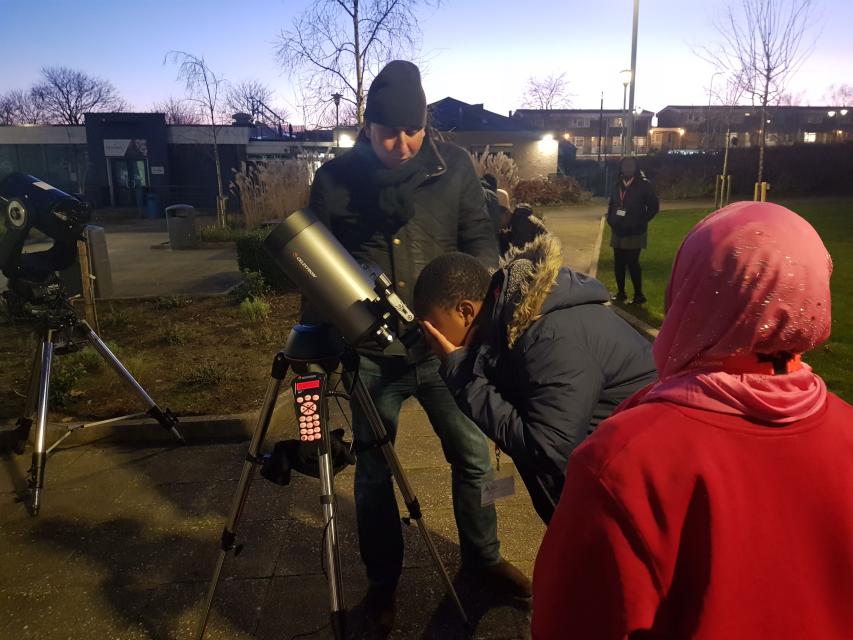Local residents joined researchers from the Department of Physics for an evening of stargazing earlier this month. The Department of Physics, in collaboration with the History of Science Museum and community leaders from African Families in the UK (AFiUK), organised the event that took place at the City of Oxford College.
The event kicked off with some top tips on how to observe the night sky from planetary researchers, Dr Katherine Shirley and Shubham Kulkarni. Katherine and Shubham then joined Alicia Martin, Olivia Ayim, and Jack Dobinson, also from the Department of Physics, to guide participants through a series of different activities, offering explanations and answering questions. Attendees were treated to an array of hands-on activities, including a build-your-own-comet station with arts and craft materials, , and object handling from the Museum. Equipment such as an infrared camera also allowed participants to explore how researchers use infrared light to remotely observe other planets in our solar system.
After the sun went down, the telescopes were set up, each one focusing on different astronomical objects. The evening was particularly clear and gave the stargazers excellent views of the Moon as well as of Saturn and Jupiter. Children and families took turns looking through the telescopes, while Professor Chris Lintott, Shubham and a community of astronomers discussed what they were seeing. As well as a selection of modern telescopes, Chris Parkin, from the History of Science Museum, brought along a Galilean telescope to view the Moon, named after Galileo Galilei, who first constructed one in 1609.
The event welcomed some 20 AFiUK children and youth , 8 AFiUK parent advocates and an AFiUK advisory board member, Moira Darlington, one of Oxfordshire’s Deputy Lieutenants as well as around 64 local residents – some of whom were just passing by on the evening including some local Brownies! For many, it was their first opportunity to look through a telescope and talk to researchers about astronomy.
This was the best one ever!
I loved today because there was pizza, telescopes, and playdough!
It was extremely interesting, especially the telescopes
[The scientists] were nice, friendly and answering clearly to all our questions
(Feedback from young people at the event)
Jacqui Gitau, Co-Founding Director of AFiUK, was at the event: ‘We looked through some ancient telescopes and some pretty modern ones too! This event for us demonstrated the awe and wonder of hands-on learning, widening opportunities, and experiences that foster natural curiosity and the agency of children as capable learners.’
The event was part of a programme of activities led by the History of Science Museum, in collaboration with scientists from the University’s Mathematical, Physical and Life Sciences (MPLS) division, and the community-based organisation AFiUK. The aim is to support the wider mission of AFiUK to foster a sense of belonging and equal opportunity among children, many of which are the second or third generation migrant families from African countries.
The event built on the success of a recent visit from AFiUK to the Department of Physics in November, where more than 20 participants enjoyed a morning on the theme of magnetism. The session included the Department of Physics Levitate! workshop on superconductors as well as the Magnets Fantastic show. Lena Shams, community engagement lead at the Department of Physics, reflected on the partnership with AFiUK: ‘We have been delighted to contribute to the excellent programme of events co-designed by the collaboration. The AFiUK children and families are so enthusiastic and fun to work with. We hope we can inspire some of the children to pursue a career in STEM.’
The project is a legacy of the Science Together project run by MPLS. Project partners include History of Science Museum, Oxford University Physics Department, Oxford University Biochemistry Department and Oxford University’s Kennedy Institute.

